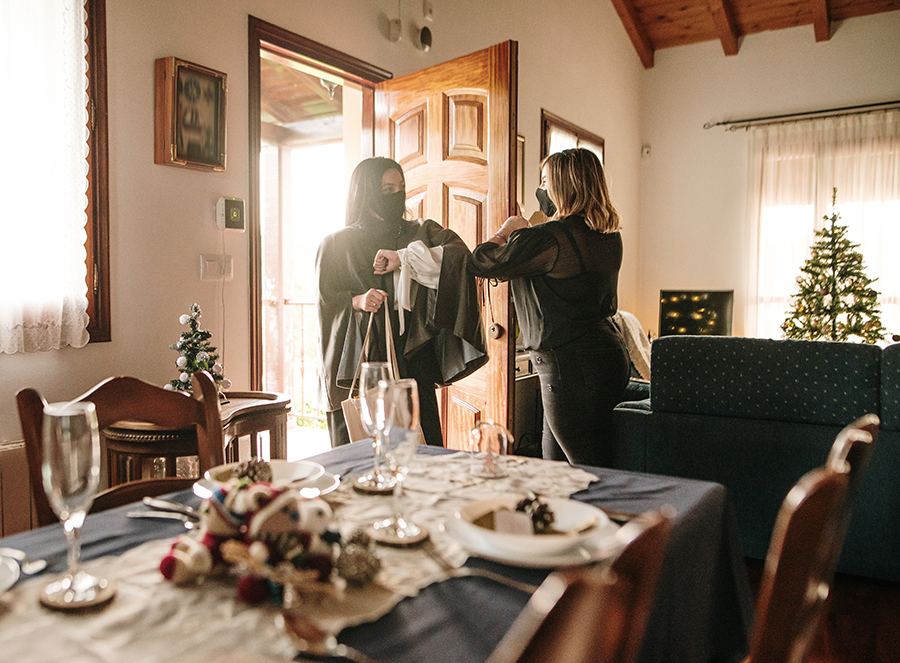Why Pandemic Etiquette Isn't Easy to Keep Up With

The new pandemic etiquette governing everything from recreational sports to dinner parties isn't easy to follow as our understanding of the virus continues to evolve. Photo: Photo: MarioGuti/Getty Images
It’s a good thing I answered the phone. It was an hour before our first pandemic-time dinner party. I was cooking an elaborate meal, which we hoped to serve outside, but the weather was not co-operating. “This is awkward,” said my friend Jo-Lynn as she asked if we were still on. It was my first experience of COVID social confusion. Why was she calling after we had exchanged numerous emails?
Normally when we entertain, we invite eight people to sit with us around a table that holds 10 in close quarters. The crush usually makes for a very convivial evening. On that night, there were just six of us — a concession to the coronavirus. When it became clear that heavy rain would not let up, my husband, Doug, came up with a novel seating arrangement: each couple sitting close together at both ends and the middle of the table with the right distance between us. Never mind that this would have been considered gauche just a short while before. We emailed a picture of the table to our guests and asked if they were okay with it, making it clear we would understand if the answer was no.
“The thing is we don’t want to come if we’re not invited,” explained Jo-Lynn, “and we don’t want to be no-shows if you’re expecting us.” I realized she had been waiting for us to reconfirm after they did. It’s just one example of how getting together now can be a potential minefield. We need a new etiquette, with new rules around RSVPs, cancelling and even disinviting.
Some of our friends are explicit from the start. “If we can’t be outside, we’re off” was the proviso with an invitation from my friend Sandy. Being completely straightforward is probably the best course, but it’s not always possible. How do you avoid repeated invitations from good friends because you know their young adult children are reckless partiers? In the summer when we had people over for backyard drinks, they’d be sheepish and apologetic if they asked to use the washroom. One even offered to go home and come back. This was a while before we learned that the virus is unlikely to be transmitted from surfaces. Our understanding has been evolving so quickly that many people can’t keep up. The matter of what makes us comfortable often trumps the science.
My friend Tanya continues to insist on using her own tennis balls. That was the rule for everyone when courts first reopened. We would serve with our own balls and try not to touch anyone else’s with our hands. The idea was to scoop them up with the racquet. It was very awkward. But it wasn’t very long before the authorities realized it was unnecessary – the usual advice about handwashing and sanitizing should mitigate any risk. I tried to tell Tanya that we still touch her balls when sending them back. “But five times is better than 25 times,” she reasoned. She has elderly parents, and doing things this way makes her feel better.
Tanya isn’t the only person who doesn’t appreciate my logic. I talk to some of the leading epidemiologists in our area at least twice a week on my radio show “Fight Back With Libby Znaimer,” so I am up to date on the latest thinking. But people often don’t welcome new facts if it takes them out of their comfort zone. I couldn’t convince cautious boomer neighbours that there was no need to bring their own food and dishes to a backyard meal. Then I tried to tell a young co-worker about tests that show the type of bandana she favours is least effective at preventing transmission. “This is the face covering I choose” was the huffy retort.
I am trying to be tolerant, but this worries me. The focus on how we feel at the expense of what we know just contributes to the growing distrust of science, and following the science is the only way we will get out of this. That’s the big picture.
In the meantime, another COVID-era holiday is coming up. I have already invited a friend but I just learned my nephew and his partner from British Columbia will be visiting. Do I tell her and give her the option of bowing out? Will that seem like I am trying to disinvite her? I wish there was a road map. But while I wait for the Emily Post of the pandemic, I can only agree with Jo-Lynn: “This is awkward!”
A version of this article appeared in the Nov/Dec 2020 issue with the headline “Pandemic Etiquette,” p. 30.
RELATED: